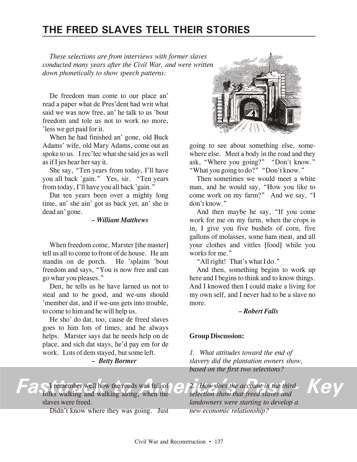| Fasttrack
to America's Past Teacher Key |
|
| Fasttrack
to America's Past Teacher Key |
|
 Page 137 |
Page 137 -
The Freed Slaves Tell Their Stories The reading selection These interviews give an interesting look at the end of slavery from the point of view of the freed slaves. The interviews were actually made during the 1930s, as part of a government program during the Great Depression. The people speaking were, of course, quite elderly by then. But their memory of the great day of freedom is sharp indeed, as their remarks prove. The interviews were written down phonetically to record speech patterns, which can be useful to linguists and historians alike. It is worth reminding students that even today, many areas of the country - North and South - have distinct variations of speech. The picture The gateway at Fort Sumter, where the first shots of the Civil War were fired. The war led to the emancipation of all slaves in the U.S. The image suggests the destructiveness of the war, but shows that there is a road ahead into an uncertain future. The figure is very small compared to the rest of the image, suggesting perhaps that an individual's life can be swept up and overwhelmed by the events of history. Still, the road ahead requires every individual to choose their next steps. Group discussion questions The first two
interviews show very
different attitudes by plantation owners toward the end of slavery. The speaker, Robert Falls, recalls the day he made a deal with a white landowner to trade labor for food and clothing. The impact of the free choice made a big impact on his sense of himself. "I knowed then that I could make a living for my own self, and I never had to be a slave no more." |
|
Copyright Notice
Copyright 2018 by David Burns. All rights reserved. Illustrations and reading selections appearing in this work are taken from sources in the public domain and from private collections used by permission. Sources include: the Dover Pictorial Archive, the Library of Congress, The National Archives, The Hart Publishing Co., Corel Corporation and its licensors, Nova Development Corporation and its licensors, and others. Maps were created or adapted by the author using reference maps from the United States Geological Survey and Cartesia Software. Please see the home page for this title for more information. |